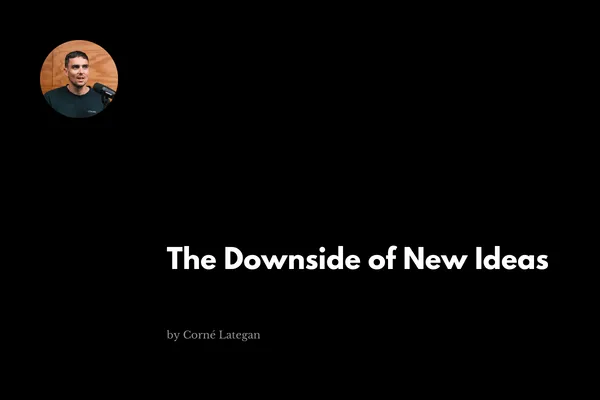Corné Lategan

The Downside of New Ideas
I find it easy to come up with new ideas.
I see ideas everywhere.
I get excited, plan it out, and start working on it. But a couple of days later, it's gone. Then I came up with an excuse why it wasn't a good idea.
This doesn’t make me feel good about myself.
Entrepreneurs love to add stuff.
We all think we can do more and win at more things. But, we can't.
Life is hectic as an entrepreneur.
We forget about time. As we move through it, complexity creeps in, and then it spirals out of control.
We add more each day. This adds complexity. It numbs us and our results. With every branch, there are another or many offshoot branches.
In the same way, we have different branches in our lives.

Let’s run an experiment to prove my point.
You get a thought: “I want a car”.
You get the car.
Now you need:
Insurance – Research, fill out some applications and pay.
Registration - Take the car to the Department of Transport. Stand in a line.
Drivers' Licence: Practice and get driving lessons for a couple of months. Then book a test and do it. You may fail a few times. In the end, you pass.
Clean - You need to wash your car. You buy all the stuff for that. You have to find time in your busy schedule to wash the car.
Drive it - You have to drive it; otherwise, it’s not worth it.
Pay for it - You have to make sure there is money in the account where they deduct the repayments.
The list goes on – because of a thought.
You can apply this thinking to any thought or idea you get.
Ideas: Become a parent, start a new hobby, and go on vacation.
What flow-on effects do you need to address because of your idea?
I sat with my brother and business partner yesterday having a coffee. After a few minutes of silence, I told him that one thing that excites me is getting traction.
Traction with a project. The feeling of a worthwhile project getting somewhere. I know it’s a bit vague – but it’s a feeling I’m after. Traction is a feeling.
I want clarity in my thinking.
I want to take on projects I care about. The projects that will bring the most value to me, my family, and anyone the project affects.
Time + Business + Growth = Complexity.
Install Better Systems
I like systems. You can set them up by deciding once. This choice covers all future decisions.
An example of this is when Steve Jobs created a system for his daily uniform. It’s a simple system, and it works. He decided once what to wear and wore the same black turtleneck and jeans every day. This spared him the complexity of choosing each day. I bet this cleared his mind and enabled him to use his mental cognition to execute projects he cared about.
People don't create systems because they overcomplicate them. They never take the time to think it through and simplify the system.
This is my mental process to create systems in life and business.
1. The Balcony Approach:
Categorise systems and see how they interconnect with the other areas of business.
The worst thing you can do is think of a system and start designing it. You have to start from the top down. You’re not going to identify a system for fixing a puncture if you’re goal is to fix cash flow.
The Balcony Approach: What node are you trying to create a system for? Family? Hobby? Business?
If it’s business, then what are the next branches?
Leadership, Marketing, Sales, Products/Services, Operations & Finance.
2. DADD Exercise
This will help you find systems or processes in the systems that are not needed.
“DADD” - Delete, Automate, Delegate or Do.
Look at the system or process of the system and ask yourself (be honest):
Can I delete this? If yes, remove it.
If I can’t delete it, can I automate it through technology?
If I can’t automate, can I delegate it to someone in the team?
If I can’t delegate it, well, then I have to do it.
3. Ownership
Once you have created systems, assign responsibility for them to someone.
This person could be you or someone else on your team. Someone needs to take responsibility and make sure the system runs.
If you created a system, and it’s not used you:
a) Wasted your time creating the system.
b) Something is going to break.
c) You won’t get the result from the system itself.
You can create systems for all areas of life and business.
Remember to start with the balcony approach before you create a system. Then use DADD to determine if the system is necessary. Find the best way to run the system and assign an owner.
A simplified mind is a clear mind.
A clear mind achieves far more than a complex mind.
I hope this helps you in your life and business.
Corné

Instagram
X
Youtube